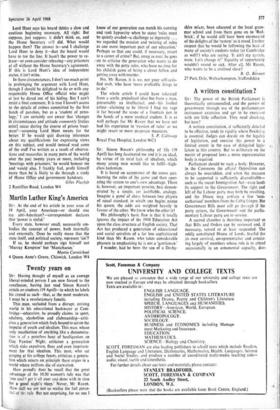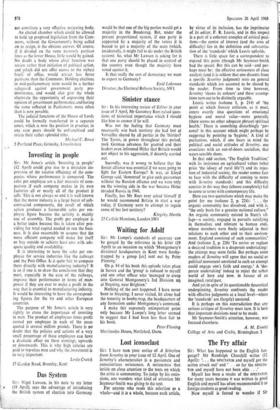A written constitution ?
Sir : The power of the British Parliament is theoretically untrammelled, and the powers of government through use of the parliamentary instrument extensive and apt to be exercised with too little reflection. They need checking, but how?
A written constitution, if Sufficiently detailed to be effective, tends to rigidity where flexibility is essential. Judges can decide on the legality of legislation, and exercise this power to a limited extent in 'the case of delegated lation in this country. But to deliberate on the merits of proposed laws a more representative body is required.
Parliament should be such a body. tiowever, in the Commons the official Opposition can always be overridden, and when the measure to be supported is sufficiently discreditable— such as the recent Immigration Act—even lends its support to the Government. The right and left of the Labour party may both be revolting, and the House may contain a few 'non- authorised' members from the Celtic fringes. But Government Bills must still go through if the party system, the Government and the parlia- mentary Labour party are to survive.
A second chamber is therefore important so that Bills and Orders can be reviewed and, if necessary, vetoed or at least suspended- The oddly constituted House of Lords, fearful for its own survival, unrepresentative and consist- ing largely of members whose role is to attend occasionally in an ornamental capacity, does
not constitute a very effective reviewing body.
An elected chamber which could be allowed to hold up proposed legislation from the Com- mons, without the Government's being called on to resign, is the obvious answer. Of course, if it divided on the same narrowly partisan lines as the lower House, little would be gained. No doubt a body whose chief function was review rather than initiation of political action, and ,vhich did not offer access to the richest fruits of office, would attract less fierce partisans than the Commons. Holding elections in mid-parliamentary term would be a further safeguard against government party pre- dominance, and would also give the whole electorate the opportunity of expressing their opinion of government performance, and having the same reflected in Parliament, more often than is now possible.
The judicial functions of the House of Lords could be formally transferred to a separate court, which is now the position in practice; in any case peers should be enfranchised and retain their rather splendid titles.







































 Previous page
Previous page